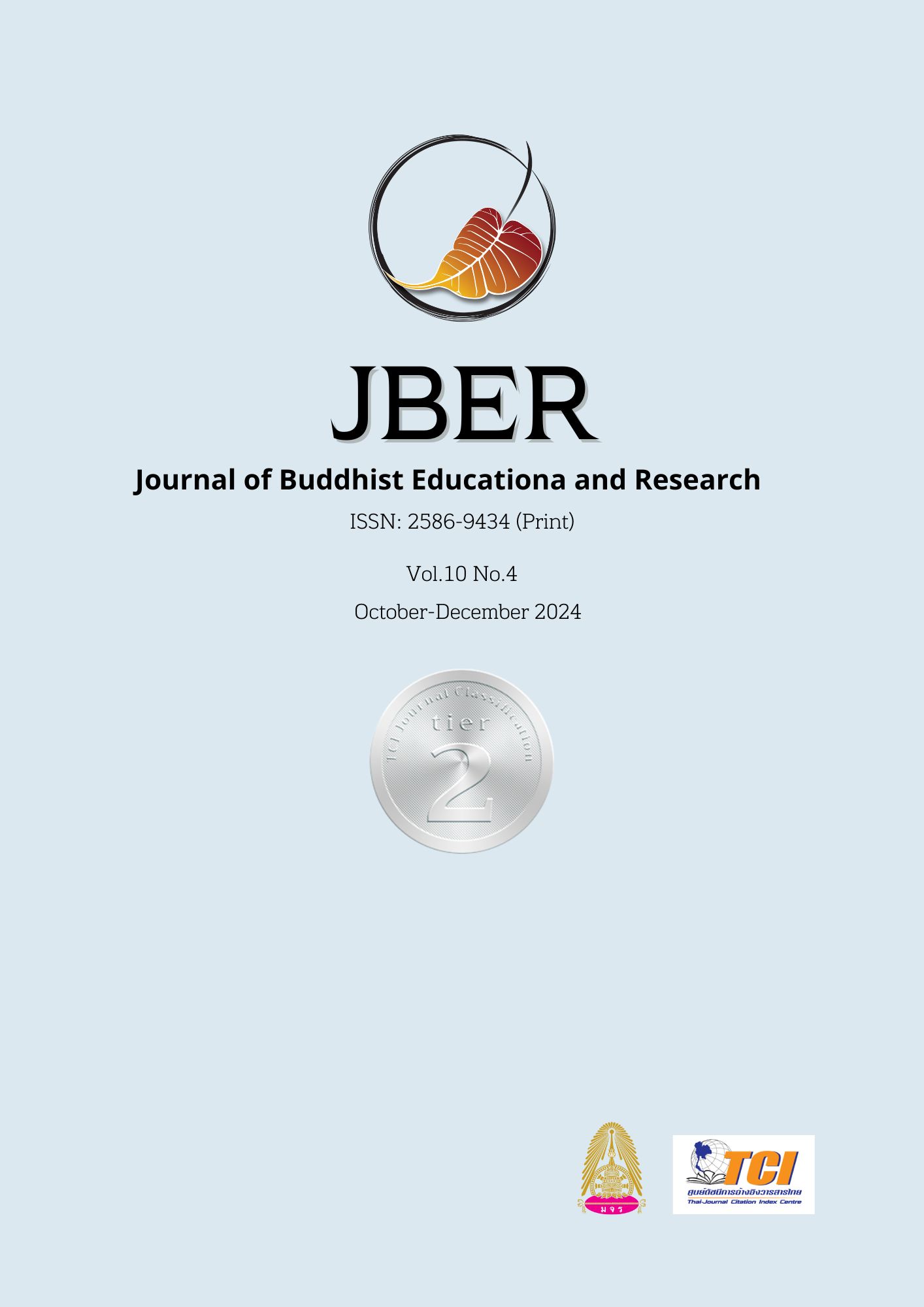A Model for Developing Digital Competence of Students in the Social Studies Curriculum in the Process of Organizing Social Studies, Religion and Culture Learning
Keywords:
Digital Competencies, Social Studies Teaching Course Students, Learning Management ProcessAbstract
This research aimed to study the competence and guidelines for developing digital competence of social studies teaching students in the learning process of social studies, religion, and culture. The research methodology consisted of 2 steps. Step 1: Study of digital competence of social studies teaching students. The sample consisted of 160 social studies teaching students. The instrument used was a student digital competence questionnaire with a 5-level rating scale. Data was analyzed with means and standard deviations. Step 2: Study of guidelines for developing digital competence of students. The informants consisted of 5 experts who were selected by purposive sampling. The instrument used was an interview form on guidelines for developing digital competence of students in the learning process of social studies, religion, and culture. Data was analyzed with content analysis. The research results found that 1. The digital competence of students in the Social Studies Teaching Program is at a high level overall. When considering each aspect, it was found that the aspect with the highest average value was digital literacy at a high level, and the aspect with the lowest average value was digital usage at a high level. 2. Guidelines for developing digital competence of students in the social studies teaching curriculum found that the curriculum should support the creation of knowledge and understanding, organize training, disseminate knowledge to students, establish a team with expertise in digital technology, and supervise, monitor, and promote the use of digital technology.
References
กณิชชา ศิริศักดิ์ และดวงกมล ไตรวิจิตรคุณ. (2563). การวิเคราะห์องค์ประกอบสมรรถนะดิจิทัลสำหรับนักศึกษาหลักสูตรการสอนสังคมศึกษา, An Online Journal of Education, 15(2), 1-11.
จิณณวัตร ปะโคทัง. (2561). ภาวะผู้นำยุคดิจิทัลสำหรับผู้บริหารสถานศึกษามืออาชีพ. ศิริธรรมออฟเซ็ท.
ชูศรี วงศ์รัตนะ. (2560). เทคนิคการใช้สถิติเพื่อการวิจัย(พิมพ์ครั้งที่ 13). กรุงเทพฯ: เทพเนรมิตการพิมพ์.
บุญชม ศรีสะอาด. (2553). การวิจัยเบื้องต้น (พิมพ์ครั้งที่ 8). กรุงเทพมหานคร: สุวีริยาสาส์น.
มะยุรีย์ พิทยาเสนีย์, สุภาณี เส็งศรี, และเกษทิพย์ ศิริชัยศิลป์. (2563). แนวทางการพัฒนาสมรรถนะเทคโนโลยีดิจิทัลของนักศึกษานักศึกษาหลักสูตรการสอนสังคมศึกษา มหาวิทยาลัยราชภัฏ. วารสารมหาวิทยาลัยราชภัฏลาปาง, 9(1), 64-73.
เมษา นวลศรี และกุลชาติ พันธุวรกุล. (2564). การวิเคราะห์องค์ประกอบเชิงยืนยันสมรรถนะดิจิทัลสำหรับนักศึกษานักศึกษาหลักสูตรการสอนสังคมศึกษามหาวิทยาลัยราชภัฏ. วารสารครุศาสตร์ จุฬาลงกรณ์มหาวิทยาลัย, 49(4), 1-15.
วิชัย วงษ์ใหญ่ และมารุต พัฒผล. (2564). สมรรถนะดิจิทัล : Digital Competency. บัณฑิตวิทยาลัย มหาวิทยาลัยศรีนครินทรวิโรฒ.
ศุภกร ถือธรรม. (2564). การศึกษาสมรรถนะการปฏิบัติงานด้านดิจิทัลของบุคลากรสานักบริหารและ พัฒนาวิชาการ มหาวิทยาลัยขอนแก่น. วารสารการบริหารการศึกษา มมร. วิทยาเขตร้อยเอ็ด, 1(3), 13 - 21.
ศูนย์เทคโนโลยีสารสนเทศและการสื่อสาร สำนักงานปลัดกระทรวงศึกษาธิการ. (2563). ยุทธศาสตร์การพัฒนาดิจิทัลเพื่อการศึกษาของกระทรวงศึกษาธิการ. http://asqa.psru.ac.th/news/policy_digital(63-67).pdf
สุกัญญา แช่มช้อย. (2562). การบริหารสถานศึกษาในยุคดิจิทัล (พิมพ์ครั้งที่ 2). โรงพิมพ์แห่งจุฬาลงกรณ์มหาวิทยาลัย.
สำนักงานข้าราชการพลเรือน. (2562). ทักษะด้านดิจิทัลของข้าราชการและบุคลากรภาครัฐเพื่อการปรับเปลี่ยนภาครัฐเป็นรัฐบาลดิจิทัล. สำนักงานข้าราชการพลเรือน.https://www.ocsc.go.th/sites/default/files/attachment/circular/w6-2561- attachment_0.pdf
สำนักงานคณะกรรมการดิจิทัลเพื่อเศรษฐกิจและสังคมแห่งชาติ. (2562). นโยบายและแผนระดับชาติว่าด้วยการพัฒนาดิจิทัลเพื่อเศรษฐกิจและสังคม (พ.ศ. 2562 - 2580). กระทรวงการดิจิทัลเพื่อเศรษฐกิจและสังคม.
สำนักงานคณะกรรมการดิจิทัลเพื่อเศรษฐกิจและสังคมแห่งชาติ. (2562). 25 Elements Digital Competency. สำนักงานคณะกรรมการดิจิทัลเพื่อเศรษฐกิจและสังคมแห่งชาติ. https://www.dlbaseline.org/digital-competency
สำนักงานเลขาธิการสภาการศึกษา. (2559). การเปลี่ยนแปลงด้านการศึกษาในยุคดิจิทัล. สำนักงานเลขาธิการสภาการศึกษา. http://backoffice.onec.go.th/upload/OECForum-13.pdf
สำนักงานเลขาธิการสภาการศึกษา. (2551). รายงานการวิจัย สมรรถนะนักศึกษาหลักสูตรการสอนสังคมศึกษาและแนวทางการพัฒนานักศึกษาหลักสูตรการสอนสังคมศึกษา ในสังคมที่เปลี่ยนแปลง. สกศ.
สำนักงานเลขาธิการสภาการศึกษา. (2562). รายงานการศึกษา เรื่อง แนวปฏิบัติของการสร้างและส่งเสริมการรู้ดิจิทัลสาหรับนักศึกษาหลักสูตรการสอนสังคมศึกษา. บริษัทพริกหวานกราฟฟิคจำกัด.
เอกชัย กี่สุขพันธ์. (2560). การบริหารสถานศึกษายุคดิจิทัล (School management in digital era). ทรูปลูกปัญญา. http://www.trueplookpanya.con/knowledge/52232/-edu
อริยวัฒ เฉลิมกิจ. (2564). แนวทางการพัฒนาสมรรถนะการใช้เทคโนโลยีสารสนเทศของนักศึกษาหลักสูตรการสอนสังคมศึกษาในสถานศึกษาสังกัดสำนักงานคณะกรรมการอาชีวศึกษาจังหวัดพระนครศรีอยุธยา. วารสารมหาจุฬาวิชาการ, 8(3), 192 - 204.
Anders Skoy. (March 2016). What is Digital Competence?. Center for Digital Dannelse. https://digital-competence.eu/dc/front/what-is-digital-competence/
UNESCO. (2008). UNESCO ICT Competency Standards for Teachers: Policy Framework. https://unesdoc.unesco.org/ark:/48223/pf0000156207
Downloads
Published
How to Cite
Issue
Section
License
Copyright (c) 2024 Journal of Buddhist Education and Research (JBER)

This work is licensed under a Creative Commons Attribution-NonCommercial-NoDerivatives 4.0 International License.





